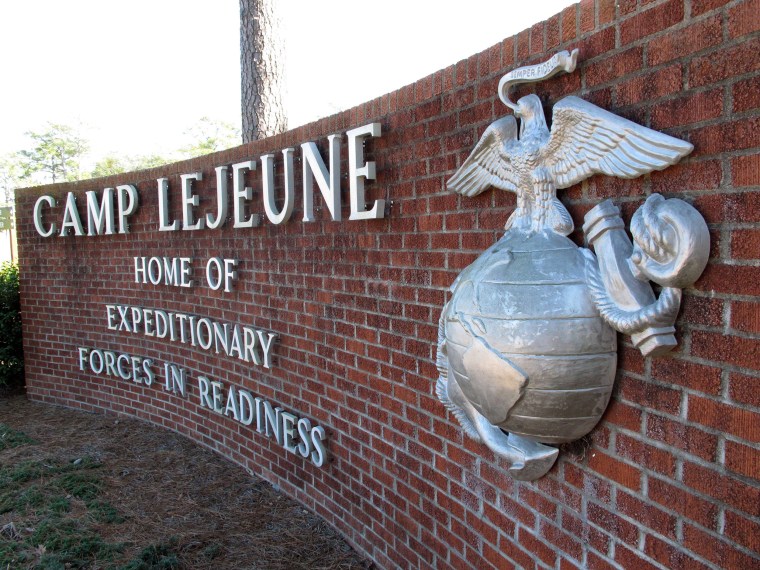Breaking News Emails
The Secretary of the Navy is denying all remaining civil claims by individuals exposed to contaminated drinking water at Camp Lejeune in North Carolina, leaving roughly 4,500 plaintiffs with claims of more than $63 billion in damages with no cash payouts.
In an exclusive interview with NBC News, Secretary of the Navy Richard Spencer defended the decision, saying the law does not support the claims.
"There is no legal way for the Department of the Navy" to pay damages in these cases, Spencer said. "We are denying the claims to free everybody to take their own course of action."
Spencer acknowledged this will be "tremendously difficult" for the claimants, who will have little chance of receiving a large monetary pay out for their losses. Individuals have six months to appeal the decision.

Believed to be one of the largest water contamination cases in U.S. history, there are roughly 4,500 open tort claims against the Department of the Navy. The Navy wasn't able to provide the exact number of people involved since some were filed by groups and new claims are still coming in.
From the 1950s until the late 1980s, people living or working at Camp Lejeune, a Marine Corps Base in Jacksonville, North Carolina, may have been exposed to drinking water contaminated with dangerous chemicals, according to numerous government research studies. Two contaminated wells on the base closed in 1985, but sailors, marines, families, and civilians on base had already been exposed to contaminants for decades.
The Department of Veteran Affairs has estimated that up to 900,000 service members were potentially exposed to the contaminated water. In 2017, the Obama administration agreed to provide disability benefits totaling more than $2 billion to veterans who had been exposed to tainted drinking water while assigned to Camp Lejeune.
The rule covers veterans who were diagnosed with one of 15 diseases, including leukemia, liver cancer and Parkinson's disease.
The denial of the claims will not impact medical care or disability benefits for the thousands of people receiving treatment.
Spencer said his decision was based on the fact that three separate legal statutes make the government immune from the claims.
Men say Camp Lejeune drinking water led to their breast cancer
Feb. 23, 201301:45The first is based on a North Carolina law that sets a strict timeline of 10 years for the injured party to file a civil claim for injuries. The law applies even if the injured party is not aware of the exposure until after the 10-year deadline. Because the wells at Camp Lejeune closed in 1985, the deadline for filing passed in the late 1990s.
The second argument for dismissing all the Camp Lejeune claims is based on an exemption to the Federal Tort Claims Act called discretionary function, which protects the U.S. government from lawsuits in cases where negligence was not clearly established. In the case of Camp Lejuene, no one was instructed to cut off the water supply, so there's no clear case of negligence, according to Spencer.
The final argument is based on the Feres doctrine, a policy that prevents military service members from suing the federal government for injuries incurred during military service.
Spencer said he was briefed on the legal limitations to the claims as soon as he started on as secretary 17 months ago. "It became apparent we had to make a decision," Spencer said. Otherwise, he added, the claimants are being kept "in limbo."
The denial of claims allows all claimants "to try other avenues that might be available to them," he said. "This was a decision that had to be made," he said. "We are acting on the situation at hand."
Over the years social media has provided an outlet for survivors and families to post about their cases. A Facebook page dedicated to the issue called The Few, The Proud, The Forgotten features stories of service members with Non-Hodgkin Lymphoma, Parkinson's disease, and various cancers and includes dates of service at Camp Lejeune and Marine Corps Air Station New River. "I lived in Tarawa Terrace for several years as a young child. Along with many health problems I have had Hodgkin's lymphoma, parathyroid adenomas, thyroid nodules and uterine tumors," one post said.
A senior defense official said the claimants really have no other legal recourse. "The truth is there is still no smoking gun about causality," the official said. "There has been no direct evidence of causation of these illnesses to the exposure."
The U.S. military has funded a number of studies to examine whether the chemicals caused the cancers and diseases, and while the studies have shown an association between exposure and development of certain diseases, they have not shown direct causality. The U.S. has spent more than $45 million on these studies over the years and has one still underway that is expected to conclude in 2022.
Spencer said he is open to more studies if the science changes and shows a direct correlation between the chemicals and these diseases. Spencer said he made this decision so victims have a clear path to move forward.
"We care about all our folks as a family," he said. "We are doing whatever we can on the health care side."
Spencer will announce the decision at a Pentagon briefing Thursday afternoon. The Navy will begin to mail the letters from Norfolk immediately, but it will take about a week to get them all processed and in the mail.
